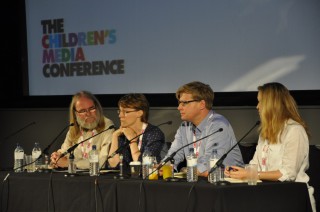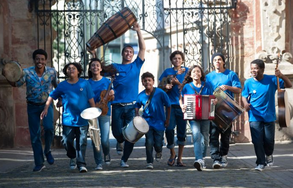At the Children’s Media Conference (CMC) on Thursday 7th July I chaired a session on the prospects and future of family films being produced in the UK. On the panel with me were Pauline Burt(CEO Film Cymru/Wales); Ansgar Ahlers (director of ‘Bach In Brazil’); and Nicole Carmen-Davies (producer of ‘Litterbugs’).
 Pauline kicked off the discussion with an outline of Film Cymru/Wales new strategy for developing/encouraging family films A combination of seed development and audience development.
Pauline kicked off the discussion with an outline of Film Cymru/Wales new strategy for developing/encouraging family films A combination of seed development and audience development.
The former, in essence, is a potential slate development deal with Chicken House, – https://www.chickenhousebooks.com/ a major UK children’s book publisher. Film Cymru is providing a small amount of funds to encourage the optioning of up to ten books. The idea being that this will promote existing UK published books and potentially provide the basis for new cinema audiences.
This use of public funded seed monies is becoming a major part of independent development in the UK, and Europe as a whole. This was reflected in the experience of new Northern Ireland production company ‘Dog Ears, in an earlier session at CMC.. They acquired £10,000 from the Arts Council of Northern Ireland to develop an App based upon characters they had created for a new TV series. This led to a self-published book proposal, which in turn led to Penguin publishers taking up the book, and ultimately becoming partners in the TV series.
The second part of Pauline’s approach was to build audiences via screening of family etc. at libraries, schools and other community venues throughout Wales/Cymru. This work is part of an overall audience building exercise being supported in part by the BFI. In Cymru/Wales this initiative is led by the Film Hub based at the Chapter in Cardiff
Ansgar Ahlers then took the audience through the ten year journey to make and distribute ‘Bach In Brazil’, an Indie family film, which has now been in the cinemas for 16 weeks, defying all expectations in Germany. This first-time feature, was made using a combination of a Co-production deal, pre-sale, TV sale and public funds.
The two key problems he identified in this lengthy and sometimes very frustrating, if ultimately rewarding, process were identifying the audience for the various funders involved and building a marketing campaign for the film on release..
The story revolves around an elderly music teacher, who ends up teaching Bach’s music to children in a detention centre in Brazil. In addition, it was shot in Germany and Brazil with the German and Portuguese languages used. So for the funders was it a Brazilian or a German film, and who was it aimed at children, or elderly people? This debate nearly stopped the funding, but with Disney International in for one third of the budget, the film had good support from early on and finally a deal was closed.
Once the film was finished the distributors faced the same questions and were uncertain how to promote the film. In the end Ansgar took it to a very family friendly German festival and won the audience award. This led to other festival successes and good reviews when it was shown at the Rio Film Festival. Ultimately it led to the realisation this was an audience film i.e. not genre film at all, but in essence a family film, loved by wide audiences.
Nicole Carmen-Davis, a UK indie producer, then outlined her own path towards an indie family film in the UK. A path familiar to many UK producers. Having worked up a feature idea, The Witches Institute, with director Peter Stanley Ward, she realised they did not have the tack record to make it. Therefore, they set out make “Litterbugs’ http://www.treehousedigital.com/litterbugs-short-film/ a short film with all the VFX needed for the feature film. This was only possible owing to the help of several people in the industry, which supplemented a small amount of money given by Creative England. This kind of ‘free’ support combined with public ‘seed’ monies has been the hallmark of several short and low budget films in the UK.
In conclusion, with questions from the audience it was recognised that the dearth of UK produced family and children’s films reflects the problems faced by ‘Bach in Brazil’. In addition, the use of small amounts of public ‘seed’ monies for early development are critical for new talent to stand any chance of making a feature film. Beyond these production issues there is also a need to build new audiences, and an awareness of the need for local UK-produced, and focused, family and children’s films.
With the BBC and others e.g.Creative Scotland looking to make new family orientated features let us see what next year’s CMC session will reveal has happened in the coming twelve months.


